PrAACtical Groups: Let’s Be Authors
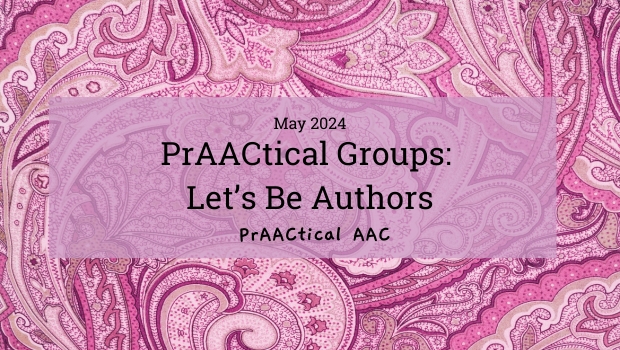
Our series on AAC group therapy continues with guest authors Marisa Portanova and Marnina Allis. In today’s post, they share ideas for helping young AAC users enhance their literacy skills.
::::::::::::::::::::::::::::::::::::::::::::::::::::::::::::::::::::::::::::::::::::::::::::::::::::::::::::
PrAACtical AAC Groups Made Easy – Let’s Be Authors
Last week, we discussed our ongoing weekly groups. Once we had success and saw progress made in the weekly groups, we came up with the concept of “AAC intensive groups,” where children would come in over a school break for a week and participate in the AAC groups for 5 consecutive days, for a longer stretch (about two and a half hours). This gave children a chance to interact with children from different classes and helped reduce the regression of learned AAC skills over the school break.
During those weeks, we picked one book per day for the first 4 days. Day 5 was for review, discussing opinions of each story, and writing our own book together. We chose books using PRC Saltillo’s Literacy Planner. Each literacy planner comes with a fun theme, such as “Animal Talk.” Each day had its own book, followed by an art activity, sensory activity, music activity, movement activity, and writing activity. We started with a book walk, introduced target core and fringe vocabulary related to the book, and modeled those vocabulary words on the children’s speech-generating devices. After explicit instruction of the word, symbol, and its meaning, aided language stimulation was provided throughout the day. We modeled without expectation. Sounds too easy, right? It can be that simple! We focused on language, literacy, and having fun.
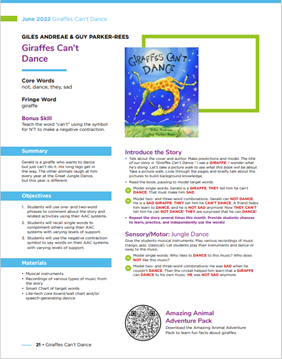
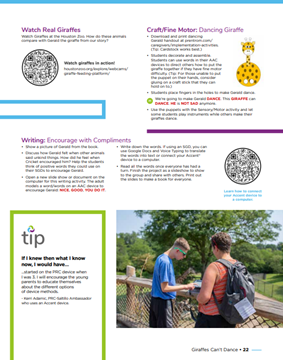
Our one-week intensive groups were made up of 3-4 children. There was an SLP assigned to each child, with an additional SLP leading the group. Below is an example of our daily schedule.
Tuesday’s Book: Giraffe’s Can’t Dance by G Giles Andreae
- Free play as all children arrive – fidget toys provided, cause-effect switch accessible toys available
- Social Greeting song to familiarize all adults and children in the room. All individuals added to each child’s SGD to maximize the opportunity for socialization.
- Introduction of the book of the day, with book walk and explicit instruction of related core and fringe vocabulary
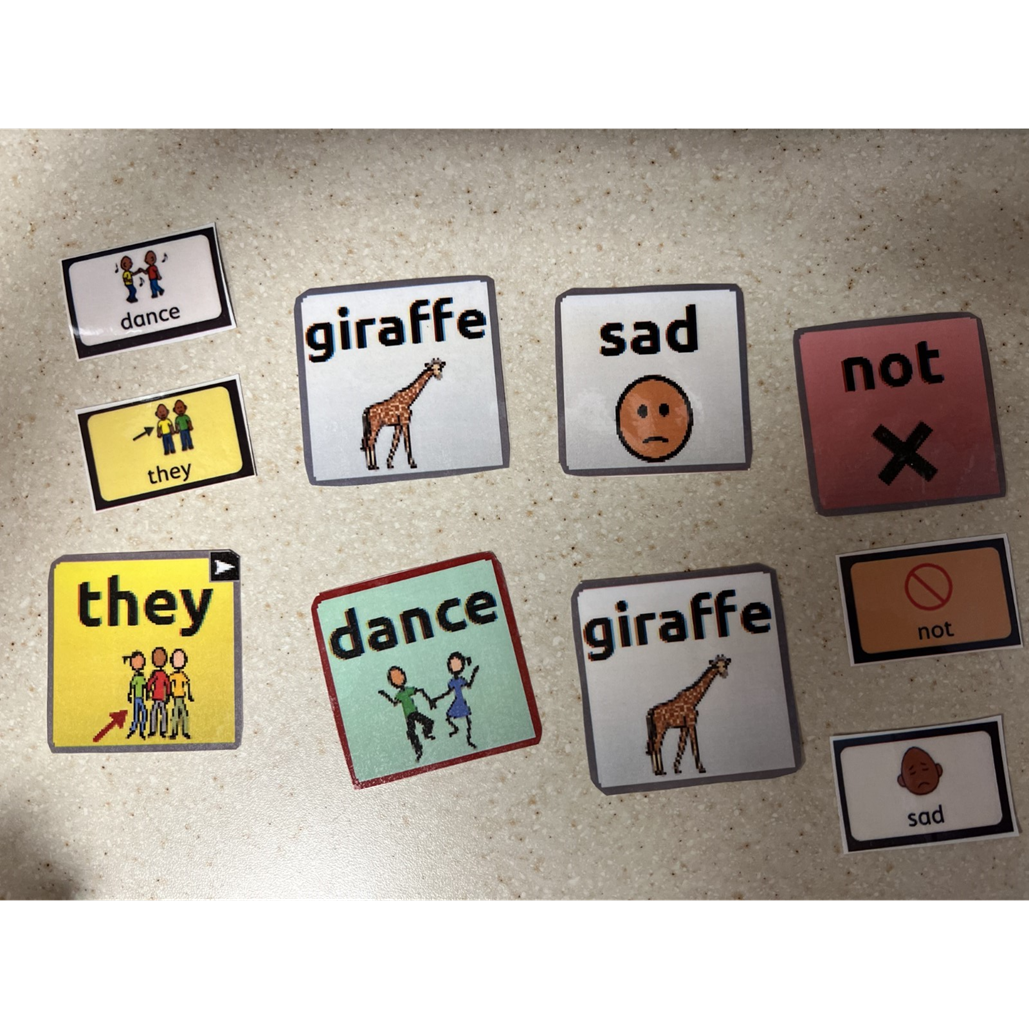
- Lead SLP Read Book aloud to the group using the shared reading strategy. Treating SLP provided aided language stimulation and modeled without expectation. Each child was given wait time to be allowed to answer a question or make a comment.
- Sensory/Motor Activity – Jungle Dance, instruments, music, dancing – Music Therapist joins, and kids engage in movement activity involving a spinner. Spin the animal spinner to move like a jungle animal.
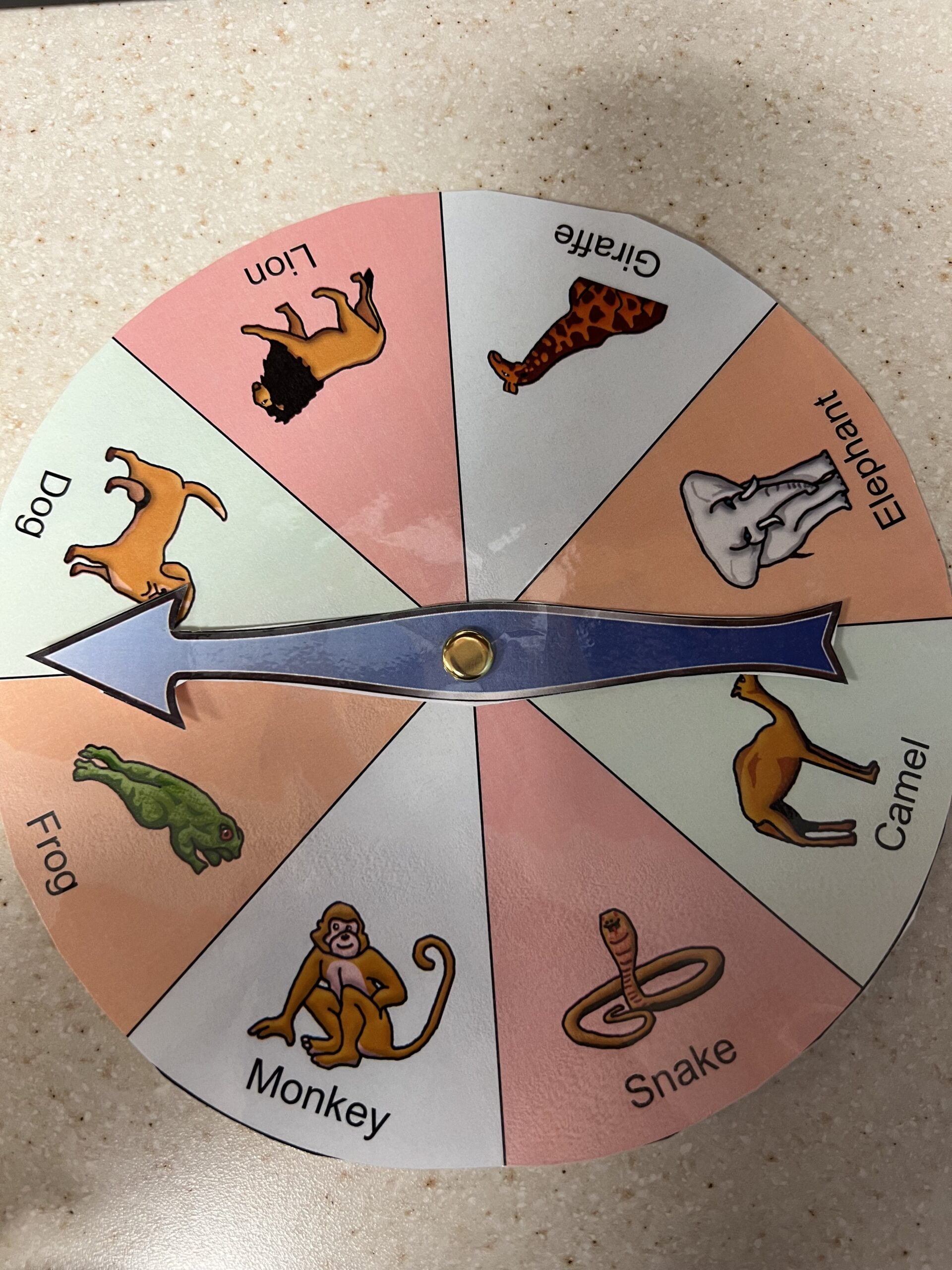
- Snack Time – meal time-related vocabulary modeled on SGD
- Watch Giraffes in action with positive, encouraging word predictive chart writing task – positive words and compliments (i.e., “I can compliment my friend by telling them…”.Bing Videos
- Giraffe dance craft
While we gave you the specific lesson plan for “Giraffes Can’t Dance,” the same applied to other books, either from the literacy planner or we came up with our own. You can too! Each day a child left with an arts and craft activity, along with a parent newsletter regarding what we did and what core/fringe words we targeted. We included QR codes with the videos so the child could watch/listen to the book at home with their family and friends. This was a nice way to ensure carryover and discussion at home if the family didn’t have the tangible book available.
Want to hear more? Tune in next week so we can make comparisons, talk about positive outcomes, and review additional tips and tricks!
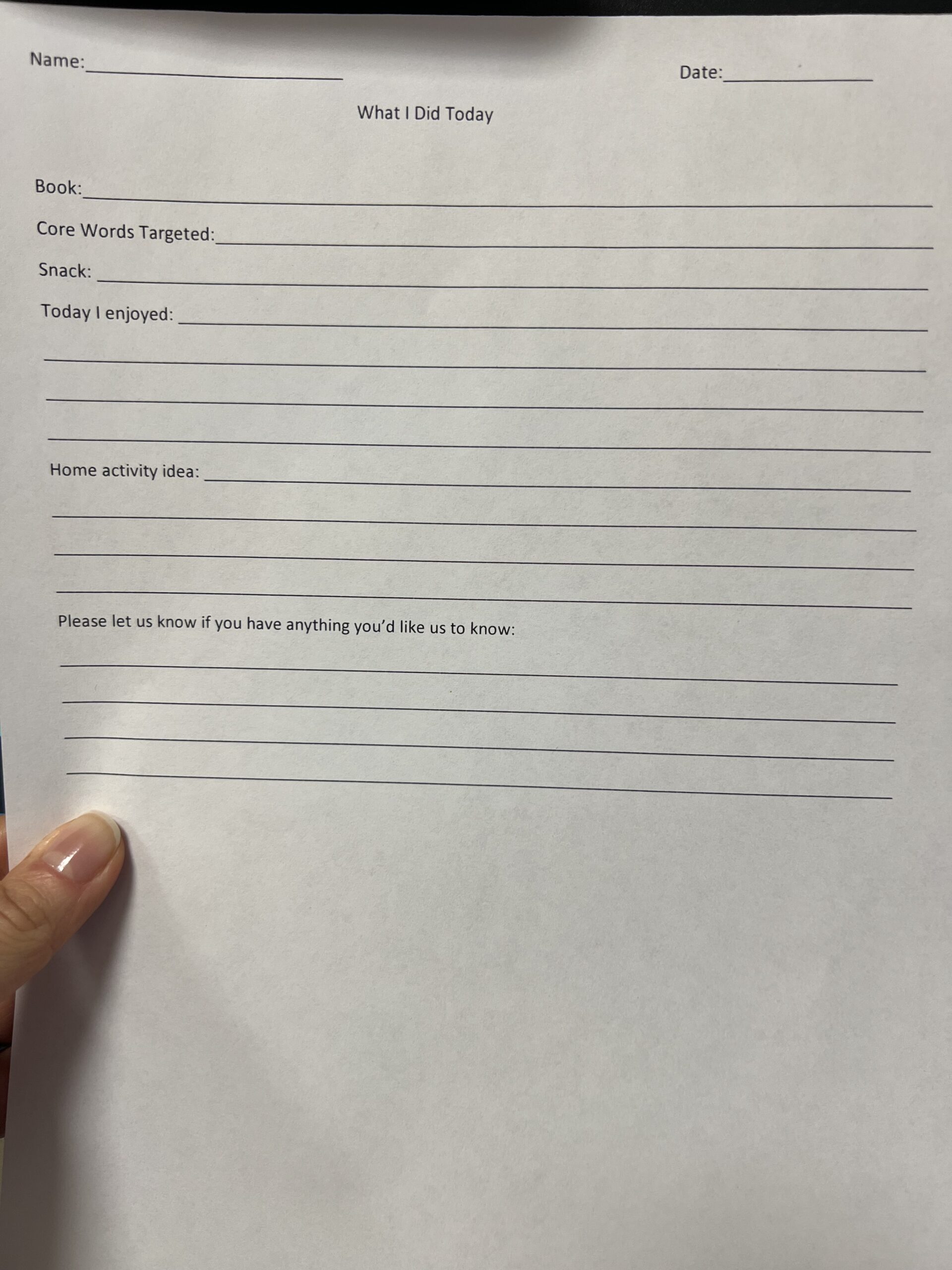
::::::::::::::::::::::::::::::::::::::::::::::::::::::::::::::::::::::::::::::::::::::::::::::::::::::::::::
About the Guest Authors
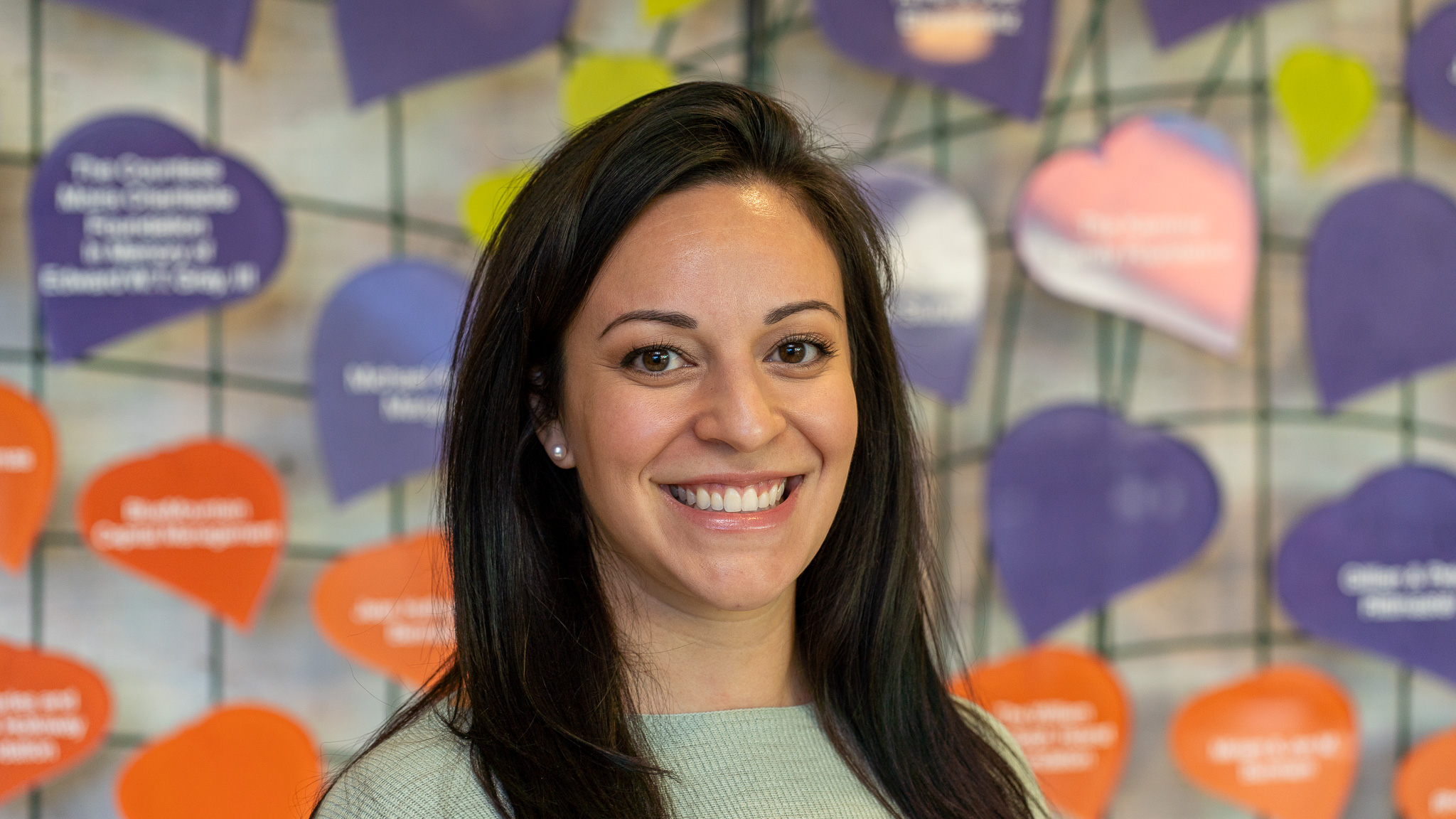 Marisa Portanova, MS, CCC-SLP, TSSLD is a Lead Clinician and a member of the Assistive Technology Core Team and Infant Feeding Evaluation Team at Blythedale Children’s Hospital. She started her career working with pediatrics in private practice, home care, and long-term care settings as well as providing services through CPSE and Early Intervention programs prior to joining Blythedale staff more than four years ago. Ms. Portanova earned her bachelor’s degree from the University of Delaware and master’s degree from New York Medical College.
Marisa Portanova, MS, CCC-SLP, TSSLD is a Lead Clinician and a member of the Assistive Technology Core Team and Infant Feeding Evaluation Team at Blythedale Children’s Hospital. She started her career working with pediatrics in private practice, home care, and long-term care settings as well as providing services through CPSE and Early Intervention programs prior to joining Blythedale staff more than four years ago. Ms. Portanova earned her bachelor’s degree from the University of Delaware and master’s degree from New York Medical College.
Ms. Portanova’s passion and area of specialty is Augmentative and Alternative Communication (AAC) as well as Infant Feeding. She participates in multidisciplinary Assistive Technology evaluation and treatment of children with varying needs. Ms. Portanova also provides training for Hospital and School staff in addition to families of children who are AAC users. Ms. Portanova works with families to obtain speech-generating devices and continues to support caregivers through ongoing education. She treats children with a variety of medical diagnoses, as well as speech, language, and feeding deficits in the Hospital’s Infant & Toddler, Pediatric, Adolescent, Day Hospital, and outpatient units, in addition to supporting the Hospital’s graduate student clinician rotation program.
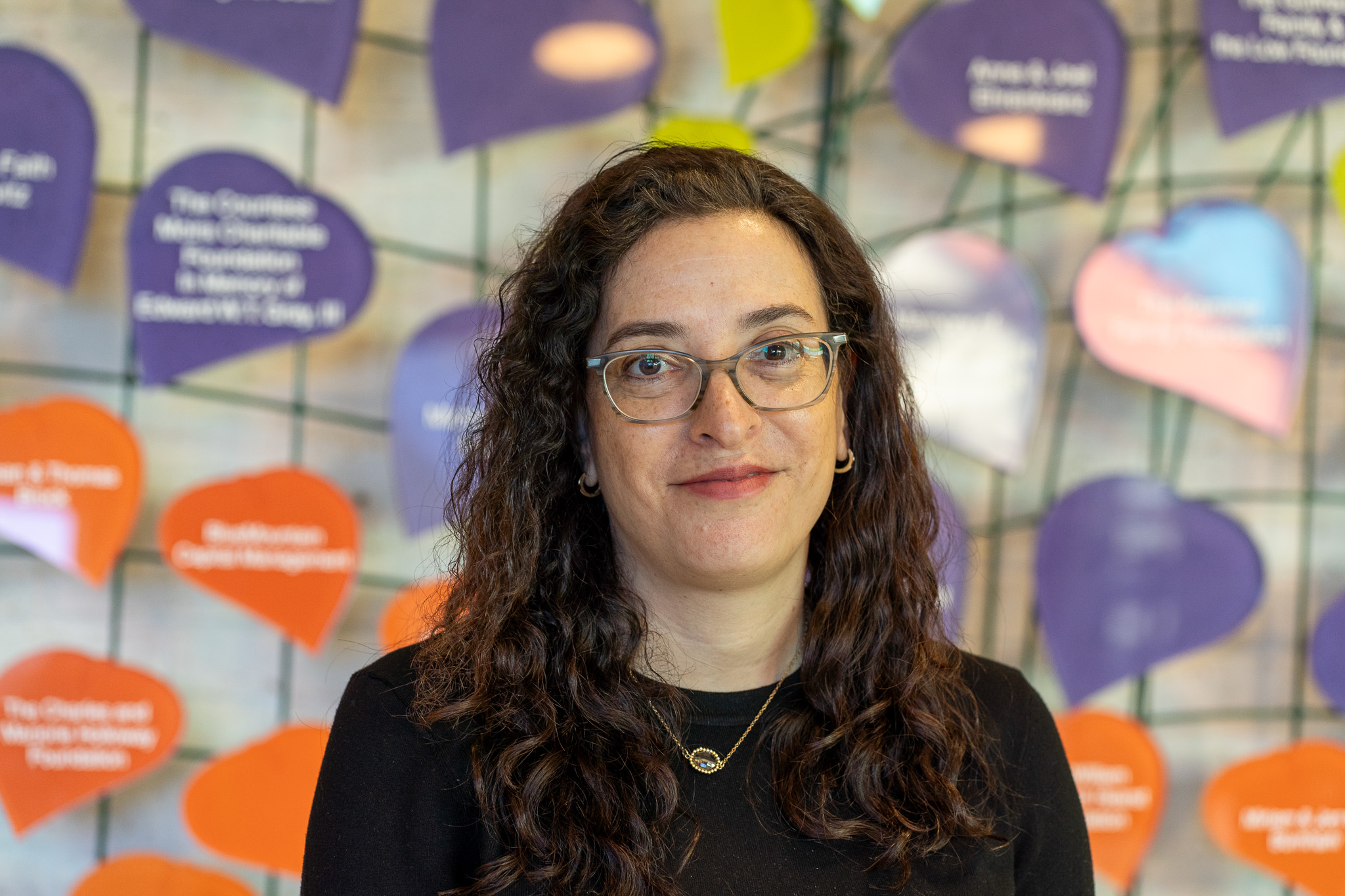 Marnina Allis, CCC-SLP, ATP, is the Assistant Director of Speech Pathology and a member of the Assistive Technology Core Team at Blythedale Children’s Hospital. She started her career in the New York City public school system, prior to joining Blythedale’s staff more than 20 years ago. Ms. Allis earned her bachelor’s degree from Stern College at Yeshiva University and master’s degree from Teacher’s College at Columbia University. She is certified by RESNA as an Assistive Technology Professional, and trained in Neuromuscular Developmental Treatment (NDT) and Language Acquisition Through Motor Planning (LAMP). Ms. Allis’ passion and area of specialty is Assistive Technology, specifically Augmentative and Alternative Communication. She participates in multidisciplinary Assistive Technology evaluations and treatment for children with varying needs. Ms. Allis also provides training for other department and Hospital staff, orders devices, and maintains relationships with a variety of Assistive Technology vendors. She treats children with a variety of medical diagnoses, as well as speech, language and feeding issues on the Hospital’s infant/toddler, pediatric, adolescent, day hospital and outpatient units.
Marnina Allis, CCC-SLP, ATP, is the Assistant Director of Speech Pathology and a member of the Assistive Technology Core Team at Blythedale Children’s Hospital. She started her career in the New York City public school system, prior to joining Blythedale’s staff more than 20 years ago. Ms. Allis earned her bachelor’s degree from Stern College at Yeshiva University and master’s degree from Teacher’s College at Columbia University. She is certified by RESNA as an Assistive Technology Professional, and trained in Neuromuscular Developmental Treatment (NDT) and Language Acquisition Through Motor Planning (LAMP). Ms. Allis’ passion and area of specialty is Assistive Technology, specifically Augmentative and Alternative Communication. She participates in multidisciplinary Assistive Technology evaluations and treatment for children with varying needs. Ms. Allis also provides training for other department and Hospital staff, orders devices, and maintains relationships with a variety of Assistive Technology vendors. She treats children with a variety of medical diagnoses, as well as speech, language and feeding issues on the Hospital’s infant/toddler, pediatric, adolescent, day hospital and outpatient units.
Filed under: Featured Posts
This post was written by Carole Zangari
